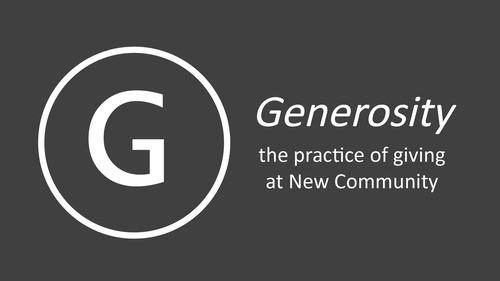
Generosity - a study for life groups
This study material is designed to be used with the Generosity leaflet and the associated videos.
(If using the app the leaflet is in the first tab and the videos in the second tab).
The videos are numbered 1 to 4.
"Read section titled..." refers to the section in the Generosity leaflet.
If you'd like printed copies of the leaflet or the questions please contact the church office.
Discussion questions for life group leaders and individuals
Thanks for taking the lead on Generosity! As you work through this study I would encourage you to be open to God and to one another. Don’t rush the discussion. It is worth going at the pace of the group.
Each section has three parts. Something to watch, something to read, and something to discuss. You will find the relevant discussion questions below.
Before you begin the study, pause and pray, asking that God will speak to each person present by his Holy Spirit.
(If using the app the leaflet is in the first tab and the videos in the second tab).
The videos are numbered 1 to 4.
"Read section titled..." refers to the section in the Generosity leaflet.
If you'd like printed copies of the leaflet or the questions please contact the church office.
Discussion questions for life group leaders and individuals
Thanks for taking the lead on Generosity! As you work through this study I would encourage you to be open to God and to one another. Don’t rush the discussion. It is worth going at the pace of the group.
Each section has three parts. Something to watch, something to read, and something to discuss. You will find the relevant discussion questions below.
Before you begin the study, pause and pray, asking that God will speak to each person present by his Holy Spirit.
Section 1
Watch video 1.
Read section titled: Generosity is at the heart of God.
Open the Bible and read Matthew 6:19-24.
Then discuss the following questions:
1. Before we dive into the Bible let’s pause for a moment and discuss what we learnt about money from our families of origin. What we learnt about money during those adolescent years shapes much of the way we approach money in the present. So how was money viewed in your family? How was it used? How has it shaped your own approach to saving, spending and sharing?
2. Now go ahead and discuss Matt 6:19-24. In your own words, try to summarize what Jesus is saying. Do you agree with Jesus’ words about two masters? Why, why not?
3. When was the first time you ever gave to anything? Describe why you gave and when you gave. What did you learn about yourself? What did you learn about the power of money?
4. Honestly, right now, from where you sit, ask yourself this question: Who do you ultimately serve? In who do you ultimately trust for your security – is it God? Or is it money?
Read section titled: Generosity is at the heart of God.
Open the Bible and read Matthew 6:19-24.
Then discuss the following questions:
1. Before we dive into the Bible let’s pause for a moment and discuss what we learnt about money from our families of origin. What we learnt about money during those adolescent years shapes much of the way we approach money in the present. So how was money viewed in your family? How was it used? How has it shaped your own approach to saving, spending and sharing?
2. Now go ahead and discuss Matt 6:19-24. In your own words, try to summarize what Jesus is saying. Do you agree with Jesus’ words about two masters? Why, why not?
3. When was the first time you ever gave to anything? Describe why you gave and when you gave. What did you learn about yourself? What did you learn about the power of money?
4. Honestly, right now, from where you sit, ask yourself this question: Who do you ultimately serve? In who do you ultimately trust for your security – is it God? Or is it money?
Section 2
Watch video 2.
Read section titled: The why behind giving?
Open the Bible to any of the relevant passages listed but in particular read 2 Corinthians 11:7-10, and
2 Corinthians 8: 13-15.
Then discuss the following questions:
1. Out of the three reasons outlined, which is the easiest for you to affirm and which is the most difficult to accept? Why?
2. It can be relatively easy for people to set up a direct debit to the church and then forget about their ‘giving’, or rummage through their wallet on a Sunday and place some money in the boxes. So if we are going to give, how can we do so in a way that feels like an ongoing act of worship?
3. We live in a highly complex consumer world. We are used to ‘getting what we pay for’. So how can we posture our giving to others or to the church without it feeling like that kind of transaction?
4. What can the church leadership do to ensure that people’s generosity is used wisely and effectively?
Read section titled: The why behind giving?
Open the Bible to any of the relevant passages listed but in particular read 2 Corinthians 11:7-10, and
2 Corinthians 8: 13-15.
Then discuss the following questions:
1. Out of the three reasons outlined, which is the easiest for you to affirm and which is the most difficult to accept? Why?
2. It can be relatively easy for people to set up a direct debit to the church and then forget about their ‘giving’, or rummage through their wallet on a Sunday and place some money in the boxes. So if we are going to give, how can we do so in a way that feels like an ongoing act of worship?
3. We live in a highly complex consumer world. We are used to ‘getting what we pay for’. So how can we posture our giving to others or to the church without it feeling like that kind of transaction?
4. What can the church leadership do to ensure that people’s generosity is used wisely and effectively?
Section 3
Watch video 3.
Read section titled: How should I give?
Open the Bible and read Matthew 6:2-4 and
2 Corinthians 9:6-12.
Then discuss the following questions:
1. Out of the three reasons outlined, which is the easiest for you to affirm and which is the most difficult to accept? Why?
2. In 2 Corinthians, Paul is coming to collect an ‘offering’ for believers in Jerusalem who are suffering. The Corinthians had made a pledge to give and now he is hoping to come and collect it on his way to Jerusalem. Go ahead and try to summarize what he is saying. What is the ‘generous reaping’ he expects them to experience from their ‘generous sowing’?
3. The challenge with giving regularly is that nobody is watching you and you rarely receive any direct feedback! So how can a person sustain giving as a regular practice?
4. Can giving really be a spiritual practice? Can anyone share about their experience of giving and the way it shapes their spiritual life with God?
Read section titled: How should I give?
Open the Bible and read Matthew 6:2-4 and
2 Corinthians 9:6-12.
Then discuss the following questions:
1. Out of the three reasons outlined, which is the easiest for you to affirm and which is the most difficult to accept? Why?
2. In 2 Corinthians, Paul is coming to collect an ‘offering’ for believers in Jerusalem who are suffering. The Corinthians had made a pledge to give and now he is hoping to come and collect it on his way to Jerusalem. Go ahead and try to summarize what he is saying. What is the ‘generous reaping’ he expects them to experience from their ‘generous sowing’?
3. The challenge with giving regularly is that nobody is watching you and you rarely receive any direct feedback! So how can a person sustain giving as a regular practice?
4. Can giving really be a spiritual practice? Can anyone share about their experience of giving and the way it shapes their spiritual life with God?
Section 4
Watch video 4.
Read section titled: Where do I start?
Then discuss the following questions:
1. What do you think is the biggest barrier to ‘buying into generosity’ for Jesus followers? Why?
2. Have some people share their own experiences of when they first began to give regularly. What have they learnt over the years?
3. What has been the most helpful part of this study? What has been the most challenging?
4. Are you willing to begin practising generosity? Are you willing to extend your generosity? How will you do this?
Read section titled: Where do I start?
Then discuss the following questions:
1. What do you think is the biggest barrier to ‘buying into generosity’ for Jesus followers? Why?
2. Have some people share their own experiences of when they first began to give regularly. What have they learnt over the years?
3. What has been the most helpful part of this study? What has been the most challenging?
4. Are you willing to begin practising generosity? Are you willing to extend your generosity? How will you do this?
